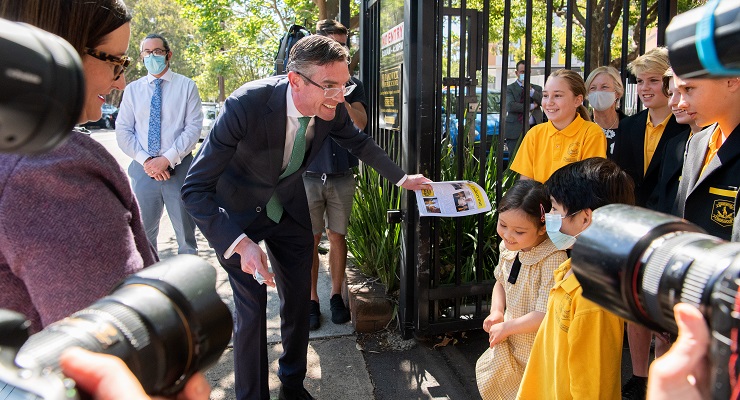
New South Wales Premier Dominic Perrottet has announced child number seven will soon join his ever-expanding family. Like almost 70% of Australian families with dependants, he and his wife, Helen, work.
Since taking over from Gladys Berejiklian, Perrottet has been quick to address the concerns of women and working parents, who are a key demographic for the NSW Liberals. He moved forward the return-to-school date, has increased domestic violence funding, and plans a cabinet reshuffle to address the party’s gender gap.
But policies across the state have major flaws for working families, creating burdens that disproportionately affect women. Policy gaps coupled with Perrottet’s conservative stance on social issues could put the party in strife with voters.
How important is the working mother vote?
Given Berejiklian was child-free and publicly single (secret relationship with former MP Daryl Maguire aside), scoring working mothers’ votes took a carefully crafted campaign. Broadly speaking, 35- to 54-year-old women with children weren’t interested in the state election. Yet they were the key to winning 20 marginal seats.
Social media posts promoting the party’s Active Kids program (which gave cash vouchers to families to pay for kids’ sports and activities) and discussing screen time and childcare campaigns targeted the demographic. Perrottet was the campaign’s spokesman.
But many of the programs aren’t as generous as they appeared, Australian Childcare Alliance NSW chief executive Chiang Lim tells Crikey.
“In Perrottet’s last budget as treasurer, he made the mistake of making only community preschool free,” he said.
Community preschool operates from 9am to 3pm whereas long day care runs from 7.30am until 6pm most weeks. There are three to four times more kids in long day care than in community preschool, Lim says.
“The irony was [that] for the exact same amount of money, the NSW government could have implemented free preschool for all kids like in Victoria by paying the gap,” Lim said, adding it was a poorly researched initiative.
Just one-quarter of Australian families with kids under four have both parents working full-time, and women are more likely to shoulder the burden of home care.
Affordability is also a problem — NSW requires higher degree-qualified teachers than in any other state and lower teacher-to-student ratios. The Productivity Commission found that although this could produce better developmental outcomes, it limits access to early education.
Importantly, while Perrottet has marketed himself as a family man, his family isn’t representative of most working families. His wife is a senior associate at Bickell and Mackenzie which specialises in family law, and he is one of 12 children from a wealthy family who attended an independent school linked to Opus Dei, a highly conservative and private Catholic prelature.
Will Perrottet resonate with women?
Perrottet voted against decriminalising abortion and same-sex marriage. This could be a problem come the 2023 state election: women are more likely to vote for left-wing parties, lecturer at the school of social and political sciences at the University of Sydney Dr Sarah Cameron tells Crikey.
“Over time there has been a reversal of the traditional gender gap in voting, not just in Australia but in other advanced democracies,” she said. “Whereas parties on the right used to have an advantage among women, now parties on the left attract more votes from women.
“Women are more supportive of abortion rights and same-sex marriage, although the bigger difference is generational — younger voters have more progressive attitudes on these issues.”
However, she says most voters aren’t swayed by leaders’ personal appeal but by their policies, and Perrottet has made headway on issues important to women.
Today he announced a $484.3 million investment in tackling domestic violence, with most going to self-contained-accommodation refuges. It’s the single largest in tackling domestic and family violence in NSW’s history and comes the same day the federal government introduced $5000 payments for those fleeing domestic violence.
“Although leadership is not the most important factor driving electoral behaviour, the (un)popularity of a leader can have a big impact on electoral outcomes,” Cameron said. “Political leaders shape people’s perceptions of the party and its policies.”








Crikey is committed to hosting lively discussions. Help us keep the conversation useful, interesting and welcoming. We aim to publish comments quickly in the interest of promoting robust conversation, but we’re a small team and we deploy filters to protect against legal risk. Occasionally your comment may be held up while we review, but we’re working as fast as we can to keep the conversation rolling.
The Crikey comment section is members-only content. Please subscribe to leave a comment.
The Crikey comment section is members-only content. Please login to leave a comment.